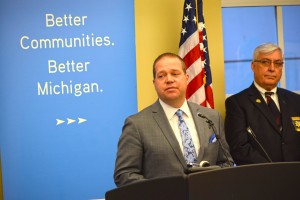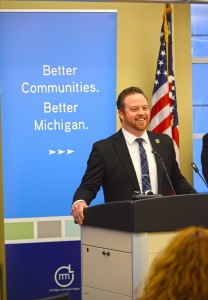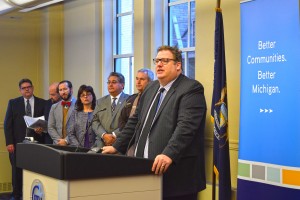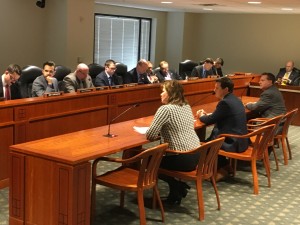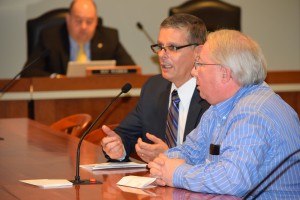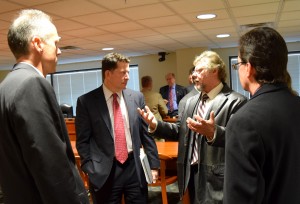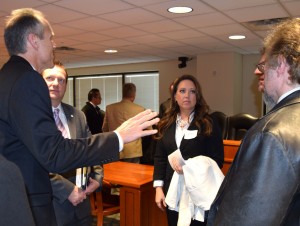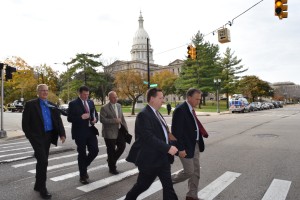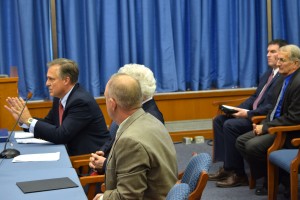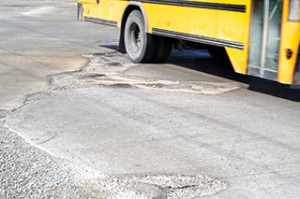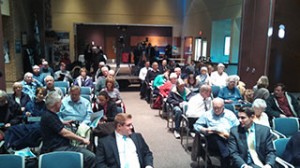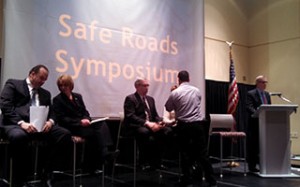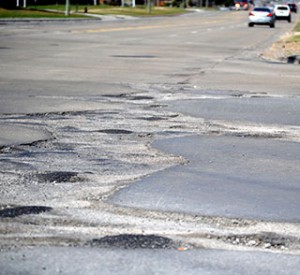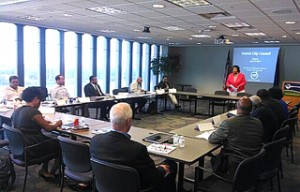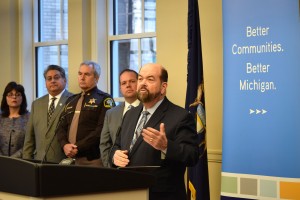
Dearborn Mayor and League President Jack O’Reilly discusses SB 571 during a news conference Tuesday, Jan. 5, 2016.
Governor Rick Snyder needs to veto a campaign finance bill sitting on his desk that would create more problems than it attempts to solve.
This was the basic message of a well-attended news conference Tuesday at the Michigan Municipal League’s Lansing office about SB 571. The event was covered by nearly a dozen members of the media, including radio, TV and print/online. Read articles about the news conference by: the Detroit News, mlive.com, WLNS TV, WILX TV, WOOD TV, Lansing State Journal, Dearborn Press & Guide, WSJM radio and subscription news services Gongwer and MIRS. The League’s call to veto this bill (read details about that here from the League’s Chris Hackbarth) seems to be gaining momentum.
Check out this Kalamazoo Gazette article that quotes some Republican lawmakers who are having second thoughts about approving SB 571. View this Detroit News editorial calling for a veto.
Senate Bill 571 passed the legislature on Dec. 16 with some extensive last-minute revisions. The bill expanded from 12 pages to 53 pages, but the very last change is the one we had the press conference about. Section 57 of the bill would prevent public entities from distributing information about a ballot proposal in the 60 days before an election.
“In other words, in the weeks before an election we cannot use a mailing or local cable outlets to inform our constituents if a measure will raise or lower their tax rate, who it will affect, if it will mean the community will be selling a piece of property and where it is, how a charter change will affect them or anything else,” said Dearborn Mayor Jack O’Reilly, president of the Michigan Municipal League.
The legislation would prohibit them from distributing public notices on television, radio and in print media explaining property tax proposals, school bond issues or changes in a local charter.
“Local officials wouldn’t even be able to tell voters in their newsletter who’s running for city council,” said League CEO and Executive Director Dan Gilmartin.
Chris Barnett, supervisor of Orion Township, said the legislation amounts to a “gag order” on election officials 60 days prior to an election.
“What (voters) expect me to do is answer questions and give them information,” Barnett said.
Republican Rochester Hills Mayor Bryan Barnett said perhaps this is a legislative effort to stop tax increases, but that’s not what’s going on in his community. Over the past four years the largely conservative community has considered seven ballot proposals, and only one was a tax increase.
To educate voters on these issues, which are often complicated, Rochester Hills government has turned to YouTube and public access television. But the line could get blurry.
“Can I respond to a resident asking a question about a millage proposal? It’s very concerning,” Barnett said.
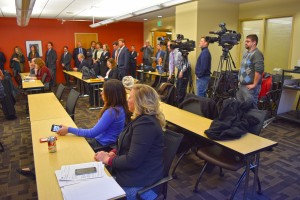
A large amount of media attend a news conference Tuesday on SB 571 at the Michigan Municipal League’s Lansing office.
That concern was echoed by Democratic Dearborn Mayor John O’Reilly, who said “we’re going to end up having a lot of effort made trying to interpret where that line is.”
Governor Snyder has until Jan. 11 to decide whether to sign or veto the bill and already some Republican lawmakers who initially voted for it are saying it might be worth a second look. Read these articles from the Kalamazoo Gazette and Holland Sentinel that talk to lawmakers willing to revisit the bill.
The press conference was emceed by League CEO and Executive Director Dan Gilmartin and featured League Board President and Dearborn Mayor Jack O’Reilly, Rochester Hills Mayor Bryan Barnett and officials representing the Michigan Association of Counties, the Michigan Townships Association, Michigan Sheriffs Association, Middle Cities Education Association, Michigan Association of School Administrators, Michigan County Roads Association, Michigan Association of School Boards, Michigan Infrastructure and Transportation Association, and the League of Women Voters. View a joint press release about the issue.
We had nearly a dozen members of the media attend including two Lansing TV stations, Michigan Public Radio, Gongwer, MIRS, mlive, Lansing State Journal, Detroit News and Detroit Free Press.
The League along with numerous communities and organizations have sent letters to Governor Snyder asking him to veto the bill. Read the veto letters from: the League, Michigan Association of Counties, and the Michigan Townships Association.
You can register your opinion about this bill with Governor Snyder during regular business hours at (517) 335-7858. Or go to https://somgovweb.state.mi.us/GovRelations/ShareOpinion.aspx.
Excerpts from articles in mlive and Detroit News about the news conference were including in this blog post.
Matt Bach is Director of Media Relations for the Michigan Municipal League. He can be reached at mbach@mml.org and 810-874-1073.


